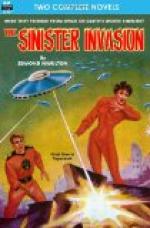“Whatever they are,” said Lockley, “I don’t want them to lay hands on you.”
They went on. Once, from the edge of a thicket of trees, they saw the highway below them and to their left. It was empty. It curved out of sight, swinging to the left again. They moved uphill and down. Now the going was easy, through woods with very little underbrush and a carpet of fallen leaves. Again it was a sunlit slope with prickly bushes to be avoided. And yet again it was boulder-strewn terrain that might be nearly level but much more often was a hillside.
Lockley suddenly stopped short. He felt himself go white. He grasped Jill’s hand and whirled. He practically dragged her back to the patch of woods they’d just left.
“What’s the matter?” The sight of his face made her whisper.
He motioned to her for silence. He’d smelled something. It was faint but utterly revolting. It was the smell of jungle and of foulness. There was the musky reek of reptiles in it. It was a collection of all the smells that could be imagined. It was horrible. It was infinitely worse than the smell of skunk.
Silence. Stillness. Birds sang in the distance. But nothing happened. Absolutely nothing. After a long time Lockley said suddenly, “I’ve got an idea. It fits into that broadcast. I have to take a chance to find out. If anything happens to me, don’t try to help me!”
He’d smelled the foul odor at least fifteen minutes before, and had dragged Jill back, and there had been no other sign of monsters or not-monsters upon the earth. Now he crouched down and crawled among the bushes. He came to the place where he’d smelled the ghastly smell before. He smelled it again. He drew back. It became fainter, though it remained disgusting. He moved forward, stopped, moved back. He went sideways, very, very carefully, extending his hand before him.
He stopped abruptly. He came back, his face angry.
“We were lucky we couldn’t use the car,” he said when he was near Jill again. “We’d have been killed or worse.”
She waited, her eyes frightened.
“The thing that paralyzes men and animals,” he told her, “is a projected beam of some sort. We almost ran into it. It’s probably akin to radar. I thought they’d put watchers on the highways. They did better. They project this beam. When it blocks a highway, anybody who comes along that highway runs into it. His eyes become blinded by fantastic colored lights, and he hears unbearable noises and feels anguish and they smell what we smelled just now. And he’s paralyzed. Such a beam was turned on me yesterday and I was captured. A beam like that on the highway at the lake paralyzed three men who were carried away, and later two others whose car ditched and who stayed paralyzed until the beam was turned off.”
“But we only smelled something horrible!” protested Jill.
“You did. I rushed you away. I’d smelled it before. But I went back. And I smelled it, and I crawled forward a little way and I began to see flashes of light and to hear noises and my skin tingled. I pushed my hand ahead of me—and it became paralyzed. Until I pulled it back.” Then he said, “Come on.”




